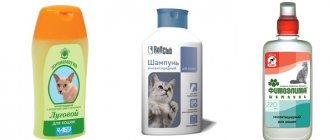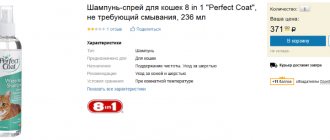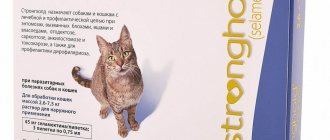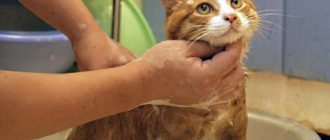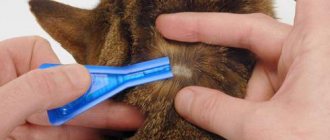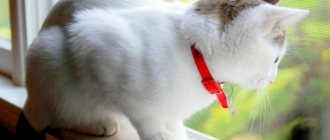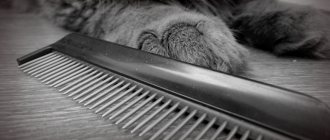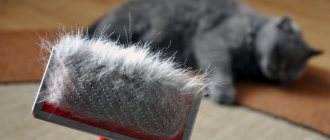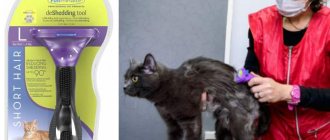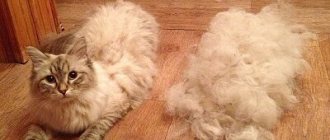Not a single cat is immune from infection with ectoparasites (fleas, ticks), even those that are never outside the living quarters. Bloodsuckers don't just cause discomfort to animals. Such parasites are also carriers of dangerous diseases. In order not to endanger your pet, you need to deal with them immediately after detection. There are many products available to kill ectoparasites, such as flea shampoo for cats. What brands of anti-flea pet shampoos are the most effective? How to use them correctly?
Efficiency and operating principle
The products are very effective. Most shampoos contain the following substances:
- permethrin;
- etofenprox;
- phenothrin.
Using cat shampoo will not harm the health of the animal. Pyrethrins penetrate the body of insects and paralyze them.
The natural components included in the products not only destroy insects, but also make the skin and coat softer. Extracts of medicinal herbs soften the effects of toxic substances.
Many detergents contain strong-smelling plant ingredients to effectively repel parasites. Fleas do not tolerate essential oils well.
Cat parasites
The principle of action of anti-flea shampoos
Of all the anti-flea products, shampoos are the most popular. According to cat breeders, it is easy to use, can be used as needed or used periodically to prevent the appearance of parasites. The price, as a rule, for shampoos is not as high as for other products, but the shelf life is unlimited by a couple of months. For at least a year, you will always have an effective detergent on hand that can be used at any time convenient for you.
The shampoo contains an insecticide, most often permethrin, etofenprox, phenothrin, chemicals that actively fight parasites. Their high efficiency and ability to quickly destroy various harmful insects has been proven many times. These substances are used in many other insecticidal products.
The poison penetrates the chitinous shell of the flea and kills the insect. The effect can be observed 48 hours after treatment. The flea shampoo Celandine, the manufacturer, in addition to the active substance, has enriched it with extracts of medicinal herbs that care for the skin and strengthen the animal’s coat.
There are no special tricks about how flea shampoo works and how to use it. Any shampoo you buy is used according to the same scheme, with the exception of some nuances. But you should ask a consultant in the store about this or read the manufacturer’s recommendation yourself.
In addition to the insecticide, the composition of the shampoo includes, in addition to the main ingredients, special oils, extracts and minerals to improve the structure of hair hairs, nourish the skin and shine. Cat breeders choose shampoo to control fleas, and often these additional bonuses play a role.
Review “I periodically buy anti-flea products for my cat, but most often I opt for shampoo. I like that it's fast and efficient. In addition, after it the wool becomes very soft and does not mat. Our “favorite” shampoo has a very pleasant aroma, which is also a plus. But I don’t like various collars because of the unpleasant smell.” Tamara, Podolsk
Mechanism of action of insecticidal shampoo
Let's look at how flea shampoo works. The insecticide included in the composition has a contact and intestinal effect. Penetrating inside the insect, it disrupts the balance of acetylcholine and activates acetylcholinesterase. As a result, the neurotransmitter does not connect to the dendrite receptors, the signal is blocked and the muscle fibers literally “freeze” in a compressed state. A paralyzed insect dies within a few minutes. For a more complete effect, the instructions recommend leaving the flea shampoo for cats on the animal’s fur for 5-7 minutes.
When choosing a product, you should pay attention to concentrated detergents, which are much more economical to use, have better contact with the coat, are richer in composition, and the treatment of your pet’s “fur coat” with their help is better.
Flea shampoo is an “ambulance” product that can rid your furry pet of parasites in one use. Therefore, it is worth taking the one with a longer shelf life. A concentrated, effective shampoo, even if used to prevent infection, may simply go bad.
It is worth reading the instructions, because shampoo intended for washing fluffy cats cannot be used to care for smooth-haired or hairless felines. They have different numbers of sweat and sebaceous glands in their skin. Those shampoos that are suitable for sphinxes will dry out the skin of Persians.
Flea shampoo for kittens
Anti-flea shampoo for kittens is appropriately labeled, contains a smaller amount of insecticide, a more gentle composition and special additives that care for the kitten’s delicate skin. Intended for washing an adult cat, it can cause poisoning in a baby.
On a note!
The cat should not be washed too often. Excessive grooming not only damages the fur and skin of your mustachioed pet, but also deprives him of a substance that is very important for mental health, which the cat licks from its fur when “washing”. Scientists say that if a cat is not allowed to toilet, it may die. Cats have a very delicate mental organization. Severe stress can undermine the health, psyche and lead to the death of the animal. Therefore, when bathing your pet, try not to traumatize its mental state - talk to the pussy, do not plunge a resisting animal into water.
Whether shampoo against fleas helps cats is determined by each animal owner himself. But if you choose the right product and follow the instructions, the result will not be long in coming.
Types of shampoos
Flea shampoo is an effective remedy for eliminating parasites. Domestic cats become carriers of fleas, which cause trouble not only for the animal, but also for humans.
Not only cats with thick, fluffy hair are susceptible to attack by parasites, but also breeds with no fur: Sphynxes, Peterbalds, elves.
In veterinary stores you can find a wide range of pet care products:
- Regular or dry shampoo with a pronounced insecticidal effect. Enriched with natural or synthesized peritroid insecticides, surfactants, and detergent components.
- Standard, washing shampoo, which is used for preventive purposes. Enriched with nutritional components, natural plant extracts, essential oils that repel insects.
Flea shampoo for cats helps eliminate parasites, which often carry worm eggs. This is a basic care product that has not only a therapeutic, but also a cosmetic effect.
How to properly shampoo a kitten
To prevent the procedure of getting rid of fleas from turning into torture for your cat, you must act correctly. Detergents come with instructions that you should read.
Hypoallergenic cat food: which one is better?
Procedure when using shampoo:
- Take a small amount of warm water into a bowl.
- Place the animal in a container of water.
- It is good to wet the animal's fur with water.
- Distribute the required amount of shampoo throughout the body.
- Leave for 5-10 minutes.
- Rinse off with running water.
- Dry the cat with a towel and brush it.
To get the best results, it is better to bathe the animal together.
Note! The shampoo should not get into the animal's eyes and ears.
My kitten right
Directions for use and precautions
Before treating an animal, you need to make the right choice of product.
Cat litter: which options are best to choose
Be sure to take into account the age of the cat. Children choose less toxic drugs with mild natural ingredients.
Insecticide-based shampoos are used when the animal is severely infested. Low-toxic agents are suitable for prevention. The instructions for many shampoos take into account the length of the cat's fur and its characteristics. Be sure to look at the expiration date.
Note! Shampoos should be used with caution for pregnant cats and small kittens.
Which flea shampoo to choose: types
There is a large selection of such products on the veterinary market.
Rolf Club
How to remove fleas from a cat at home
The drug contains 0.5% permethrin and castor oil. It does not cause allergies or skin irritation. The product is safe for cats and humans. It is used from 4 months. A 200 ml bottle costs about 500 rubles*. The product is expensive, but quickly kills all fleas.
Ms.Kiss
Miss Kiss shampoo also contains 0.5% permethrin. In addition to fleas, it also destroys ticks and lice-eaters. Used from 4 months. After using it, tangles do not form and the cat is easy to comb. The roots of the wool are well strengthened.
BIO-GROOM
The shampoo can be used from 12 weeks. It contains coconut oil, pyrethrin, protein and lanolin. The product has a mild effect on the animal’s body. It perfectly fights parasites and also has a good protective effect. It is used not only for treatment, but also for prevention.
One of the advantages of this shampoo is its low cost.
Beaphar Shampoo
Bioshampoo is used for adult cats and kittens after 3 months. It contains natural herbal remedies. Beaphar cleanses the fur of nits and fleas and quickly relieves itching. The product destroys fungus and is also an excellent antiseptic.
Shampoo "Doctor Zoo"
"Doctor Zoo" is distinguished by its diverse composition of herbs:
- chamomile;
- sage;
- rosemary;
- thyme.
It contains various oils, red pepper extract. The product eliminates itching and disinfects bite sites.
Additional Information! "Doctor Zoo" is used more as a preventive measure. As a remedy, it must be used repeatedly.
"Dana"
Api-San fights animal ectoparasites: lice, fleas, ticks. Suitable for kittens older than one year and adult animals. Dana heals insect bites, eliminates itching and irritation.
Medicinal shampoo "Lugovoy"
Manufacturers offer two varieties of the product: “For cats and dogs” and “For cats”. Both products contain permethrin and various botanicals. A small amount of neurotropic poison kills all dangerous parasites. The medicinal composition improves metabolism in the skin and hair follicles.
Therapeutic shampoo "Lugovoi" provides long-term protection against insect attacks.
The product is suitable for kittens older than one year and adult animals. It foams well and is used economically.
“Clandestine” and “Clandestine with birch tar”
The flea remedy is highly effective, since in addition to permethrin it contains fipronil. It is used for cats of any age and for dogs. The price is reasonable.
“Clandestine” with birch tar is used for pets with sensitive skin. It cleanses, moisturizes, and restores the animal's skin.
"BioVax"
The drug destroys fleas and ticks. Veterinarians recommend using it together with preventative drops and sprays. This flea shampoo for cats significantly improves the condition of the coat.
Phytoelite
Anti-flea shampoo for kittens and cats has a cleansing and healing effect. It is available in two types of bottles. In addition to the insecticide, it contains decoctions of wormwood and celandine, as well as some components beneficial to the animal body.
Additional Information! The drug has a long-lasting effect. The container has a dispenser for economical consumption.
"Leopard"
The drug is of good quality and low price. It contains many plant components. Active additives get rid of tangles and improve the condition of your pet’s coat.
The product is available in the form of a gel. "Bars" is an improved version of "Barsik".
"Barsik"
Famous shampoo for cat owners. The gentle composition allows you to use this product more often than others. Essential oils help make your cat's fur soft and silky.
“4 with a tail” (for pregnant cats)
The drug is a prophylactic agent. It does not contain toxic substances, so it can be safely used for pregnant cats.
The main component is citronella oil. The shampoo prevents the appearance of parasites and disinfects the skin and coat.
Many of these products rank high in cat shampoo ratings.
Types of shampoos for cats
Popular folk remedies
In some cases, the use of pharmaceutical insecticides and repellents to treat a pet for parasites is undesirable or even contraindicated. This may be due to being too young, pregnant, having certain diseases or allergies. In this case, folk remedies will help rid cats of fleas.
Combing
The safest, but time-consuming and labor-intensive method. You need to stock up on a metal comb with fine teeth and patience. You must comb first against the coat, being sure to grab the undercoat, and then in the direction of hair growth. At the end of the procedure, the combed hair and parasites must be destroyed immediately. By the way, this is one of the few safe ways to remove fleas from a kitten up to 1.5 months old.
Combing
Sagebrush
A long-known folk remedy for fleas in cats is dried wormwood. Insects cannot stand the smell of grass, and as soon as they smell it, they try to get away as far as possible. At the same time, the plant is absolutely safe for cats. A decoction of wormwood is used to treat fleas on animals, and bunches of dried grass are placed around the house to repel insects.
Garlic
Garlic is another natural repellent that can help get rid of cat fleas. Parasites do not tolerate the specific smell of the plant. To treat an animal, 3-4 cloves of garlic are crushed, poured with a glass of warm water and left for 10-12 hours in a dark place.
For greater effectiveness, you can add a teaspoon of brewer's yeast to the liquid. The strained liquid is applied to the animal’s withers, gently rubbing into the fur. After a day, the cat can be bathed.
Pine sawdust
The pleasant pine aroma with bright notes of resin is very disliked by insects. Pine sawdust by itself will not help remove fleas from a cat, but will be an excellent addition to the main treatment. You can fill your pet's bedding with sawdust, and wash your cat's bed and toys in pine broth.
Essential oils
Essential oils are a fragrant and effective repellent. The following scents will help get rid of fleas on your cat:
- mint;
- lavender;
- eucalyptus;
- geraniums;
- tea tree;
- carnations;
- fir trees
The product can be added to shampoo or applied to the collar. You can prepare a solution by adding 2-3 drops of oil to 2 glasses of water, which you can then use to treat the animal’s fur. After 15-20 minutes, during which you need to make sure that the cat does not lick the fur, the solution is washed off.
Vinegar
A rather radical but effective way to eliminate fleas is to treat them with apple cider vinegar. To prepare a flea mixture, you need to mix vinegar, ammonia and inexpensive cologne with a strong smell in equal proportions. Covering the cat's face, the fur is sprayed with the resulting liquid. The animal is then placed in a bag, leaving its head outside.
After 5 - 7 minutes, the bag is removed, the pet is washed and combed. Apple cider vinegar can also be used to treat indoor fleas.
Vinegar
Tar soap
Birch tar, which is part of tar soap, is an effective remedy for parasites. Bathing with tar soap is a simple and safe way to get rid of fleas, which is suitable even for recently born kittens.
Ammonia
The smell of ammonia is unbearable for fleas and many other insects. With its help, you can remove fleas from animals and drive parasites out of your home. The recipe is simple - for 1 liter of water you will need 8 - 10 drops of alcohol. The resulting solution can be used to rinse the cat after bathing or spray the room.
Hellebore water
Alcohol tincture of hellebore is an effective insect repellent. The solution is applied to the skin and fur, after 10 minutes, thoroughly washed off with shampoo. Since the product is toxic, it must be used with caution, making sure that not a drop gets on the mucous membranes or open wounds on the animal’s body.
Hydrogen peroxide
Hydrogen peroxide is diluted with water in a ratio of 1:2 or 1:3, and the resulting liquid is generously moistened with the cat’s fur. After 15 minutes, the solution is washed off. Clean water with a small amount of vinegar is enough; you don’t need to use shampoo. The disadvantage of this method is that peroxide deteriorates the quality of the coat and lightens it, so this method is not suitable for animals participating in exhibitions.
Camphor alcohol
Camphor alcohol and table vinegar, mixed in equal proportions, with the addition of a few drops of cheap cologne, is a powerful mixture that kills fleas. The smells of alcohol and cologne intoxicate fleas, and vinegar dissolves the chitinous coat. The cat is treated with the drug before bathing.
Boric acid
Boric acid perfectly dissolves the flea’s “armor” - its chitinous shell. To rid your pet of parasites, prepare an aqueous solution of boric acid; for home treatment, the powder can be used in dry form.
Salt
Table (or sea) salt is used against fleas, as it destroys the chitinous cover of parasites. The pet can be sprinkled with salt, which can be washed off after 10-15 minutes, or bathed in salt water. Bathing in a saline solution is suitable even for kittens, the main thing is that the water does not get on the face or in the ears.
Salt and soda solution
A bath with salt and soda will help your pet recover from fleas faster, and the dry mixture will help get rid of insects in the room. After mixing salt and soda in equal proportions, sprinkle flea repellent on the floors and window sills in the apartment, the surface of upholstered furniture, and carpets.
Herbal infusions
Herbs help fight insects. The smells of some plants literally cause fleas to flee. Herbal infusions will help get rid of fleas from your pet's fur:
- tansy;
- lavender;
- mint;
- eucalyptus.
Mint decoction
The cat is watered with medicinal liquid, wrapped in a towel and waited for 10 - 15 minutes. After this, the animal is rinsed with warm water.
Geranium decoction
Geranium has a similar effect on fleas as wormwood. The pungent smell repels parasites. To prepare the infusion, the leaves and stems are poured with boiling water, boiled for 15-20 minutes over low heat, then cooled and filtered. Moisten the fur with the liquid, wrap the cat in a towel for 20 minutes, then wash and comb out.
Citrus
Fleas do not like the aromatic substances contained in citrus peels. The simplest remedy for fleas is to rub your pet's fur with fresh lemon or orange peel. Dried crusts can be used to prepare a medicinal decoction. But we must remember that citrus scents are not always to the taste of cats. So sometimes it is better not to use this method.
Other
Other folk recipes for fleas include washing with laundry or dust soap, as well as an exotic remedy - vodka with vanillin. The smell of vanilla repels not only fleas, but also ticks and mosquitoes. To prepare the solution, 2-3 g of vanillin are mixed with 100 g of vodka and infused in a sealed container in a dark, cool place for 7 days. The resulting tincture is used to treat the animal's fur.
How to wash a cat if there is no special shampoo
For regular care of animals, special products are needed. They are less aggressive in composition than regular shampoos. It is best to wash the cat with warm water and beaten egg yolk. If that doesn’t work, you need compounds with PVA.
In rare cases, you can wash cats with regular shampoo or soap, but it is not advisable to do this often. The animal's skin will begin to peel off.
Let's discuss what to choose from what is in the bathroom.
Regular soap
It is not recommended to bathe a kitten with soap with a strong fruity or floral aroma. Bath, pine, and baby soap are preferable. Experienced veterinarians do not advise excessive soaping of the animal.
It is enough to pour it with soapy water or apply foam to the wool. If the surfactants (surfactants) don't touch the skin, great.
You shouldn't bathe your pet too hard. He must have natural protection.
Baby shampoo
Products used to wash children under three years of age are hypoallergenic. They contain less of all kinds of synthetic additives and more natural ingredients. But you can’t get carried away with them either.
The product is pre-diluted 1:3 and foamed well. And then the kitten is treated with foam. You need to carefully clean the face.
Phrases like “washes without tears” are a marketing ploy. When foam gets into the eyes of animals, conjunctivitis develops. The small pet will become restless. Ears are a no-go area. They are cleaned with ear sticks with water, lotion or saline solution.
Regular human shampoo
Some owners use human shampoo to care for their pets, and do this regularly. Veterinarians strictly prohibit doing this. The secretion of fatty glands is disrupted, the skin suffers, and the structure of the hairs changes.
Allergic dermatitis and other skin diseases are possible. Immunity weakens. After washing, cats get sick more often and can get pneumonia.
If there are several hair care products, choose the simplest one. It is better if it contains a decoction of herbs, without dyes or thickeners.
The soap composition is made by diluting the shampoo with water, increasing the volume at least five times. In this case, it will be possible to protect the cat from the consequences and reduce the risk of developing skin diseases.
Tar shampoo or liquid soap
Tar is an excellent folk remedy for skin irritation. Liquid soap or tar shampoo is a good insecticidal remedy for blood-sucking insects.
If your pet constantly scratches itself with its paws or bites something out of its fur, it may have fleas. Try washing it with tar soap. This primitive method is used in folk medicine.
Features of choosing shampoo for small kittens
Flea shampoo for small kittens must be special, since toxic drugs are harmful to them. Human shampoo should not be used. This may cause an allergic reaction.
You can use "Clandestine" for puppies and kittens from two months. It has an insecticidal effect. From the same age, Gamma is used.
For kittens after the first month of life, the medicinal drug “Four with a Tail” is suitable. Phytoelite is a natural detergent.
Outbred babies or smooth-haired purebred pets are taught to bathe from the first month of life. The mother carefully takes care of the little kittens. But if they are given to new owners, then after getting used to the new housing, you can organize a wash. You shouldn't do this often.
Many breeders are interested in the question of at what age can a purebred British kitten be bathed. Flea repellent is also used from the first month. If it was not possible to get rid of the parasites immediately, then repeated bathing will be organized after a week with health monitoring.
Important! You should carefully study the instructions!
Flea prevention
If you took a kitten from the street, removed fleas and want them to never appear, you need to follow some rules. Namely:
Limit the cat's contact with possibly flea-infested relatives or put on a collar that will repel new fleas. Keep the area where the kitten is kept clean and periodically spray it with special flea aerosols. It is also necessary to regularly treat your pet's toys.
If you have a cat at home, you should take care of its cleanliness before it becomes pregnant. Then, when she brings kittens, the babies will become infected with her fleas; it will be more problematic and expensive to get rid of the parasites than to carry out timely prevention.
Advantages and disadvantages
Shampoos for cats against fleas occupy a leading position among all antiparasitic drugs. However, before use, you should familiarize yourself with all the available advantages and disadvantages of the product.
Advantages of flea shampoo for cats:
- Destroys parasites at all stages of the life cycle.
- Has a softer effect compared to drops on the withers. It is allowed to wash kittens, nursing and pregnant females.
- Wide spectrum of action. Shampoos for cats also get rid of ticks, lice and other types of insects.
- Easy to apply.
- It not only fights parasites, but also effectively cleanses the pet’s fur and skin of dirt.
- A convenient way of prevention.
Among the disadvantages of this tool are:
- Short validity period. Shampoo components evaporate faster than drops.
- Possible allergic manifestations due to individual intolerance to the components of the product.
A wide selection of shampoos allows you to choose a product depending on the characteristics of each animal and achieve maximum results.
Flea drops for kittens
These flea medications can be used from 6 weeks of age. They are a very effective remedy and retain their properties on the animal’s fur for another month. Apply drops to the withers and rub well. It is necessary, just as with shampoo and with the use of other insecticidal agents (sprays, powders), to do a test - apply a very small dose to the withers and observe the kitten for a while. If everything is in order, use the drops according to the instructions. Typically, drops are sold in a pipette for one-time use, with a dosage for a specific pet weight. Therefore, before purchasing the drug, you need to weigh the kitten to know its exact weight.
Preventive recommendations
Treatment is always more difficult and more expensive than prevention. To prevent the infection from reoccurring, try to follow simple recommendations:
- Keep the area where your pet is kept clean;
- do regular examinations of your pet for the presence of parasites;
- exclude the kitten from contact with homeless animals.
Fighting fleas on a pet is a long and burdensome task, so be sure to have love and patience. Let your kitten be healthy and active without parasites and negative consequences from their appearance!
How to make your own shampoo
You can make your own shampoo at home.
Shampoo recipe:
Dissolve grated baby soap in 500 g of water and cook over low heat until it becomes jelly-like. Add finely chopped onion, chicken yolk and one teaspoon of nettle or wormwood infusion. Mix everything.
Lather the cat's fur for 10-15 minutes, then rinse with warm water. Plants repel parasites. There are practically no side effects.
At the end of the procedure, the animal must be thoroughly combed. A fine comb will help remove flea eggs.
